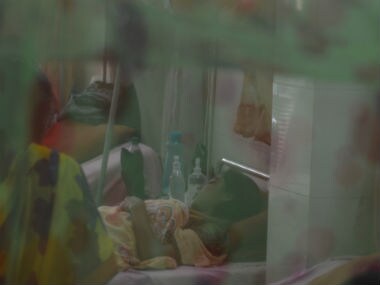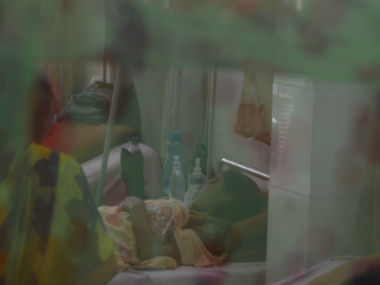Mosquitoes, bats and ticks are carriers of diseases like dengue, malaria, chikungunya, Nipah virus infection, Japanese encephalitis, scrub typhus, leptospirosis, Lyme disease and Congo fever. Globally, 17% of infectious diseases are spread by vectors - animals that form a bridge between humans and infectious microorganisms for the sole reason of transmitting disease. Vector-borne diseases also cause about 700,000 deaths annually. [caption id=“attachment_7389571” align=“alignleft” width=“380”]  Representational image. Image source: Getty Images[/caption] While India has a long history of some vector-borne diseases like malaria, others like Zika virus infection are relatively new here. Here’s a quick look at five vector-borne diseases to watch out for in India today.
Nipah virus infection
Nipah virus is a zoonotic virus - it is transmitted to humans through animals such as infected pigs or bats. During the 2001 outbreak in India, medical practitioners noticed that the disease could also spread from one infected person to another. Most of the people who caught the infection were either hospital staff or they regularly came to visit a patient. In India and Bangladesh, Nipah virus infection spreads through date palm and products made with date palm sap that has been contaminated with the urine or saliva of fruit bats. Nipah infection begins with flu-like symptoms, within five to 14 days of exposure to the virus. Fever, headache, muscle ache, nausea and vomiting are common. As the infection grows, it can lead to respiratory illness and encephalitis (inflammation of one or more parts of the brain). Kerala saw 19 cases of Nipah virus infection in May last year - 18 of those patients eventually died. In June this year, the virus again posed a threat — this time involving a larger area in the state — but local healthcare facilities were able to avoid even a single casualty.
Japanese encephalitis
Japanese encephalitis (JE) is a viral disease that affects humans and animals alike. It is transmitted by vectors such as mosquitoes, pigs and water birds. JE is the leading cause of encephalitis in Asia and the west side of the Pacific. Infection is most common in children aged 3-6. In India, 1,500-4,000 cases are reported each year. Earlier this year, more than 150 infants and children died from JE in Muzaffarpur, Bihar. They got the infection from eating contaminated litchis. Less than 1% of patients show clinical symptoms until they develop inflammation in the brain which alters the brain function. The major symptoms include fever (above 38°C), headache, lack of energy, loose stools, intense muscular pain. A common illness that can be prevented by a vaccine. Some patients may experience convulsions, motor function disabilities and unusual stiffness of the muscles.
Zika virus infection
The Union Ministry of Health and Family Welfare (MoHFW) reported India’s first case of Zika virus infection on 21 September 2018, when a 78-year-old woman from Jaipur, Rajasthan, tested positive. Following this, the state government and Central health authorities started extensive programmes for testing. On 2 November 2018, 157 people were found to be positive - of these, 63 were pregnant women. Aedes aegypti — the same mosquito that causes dengue, chikungunya and yellow fever — is the vector here. It usually bites during day time. In normal cases, the disease isn’t life-threatening. However, in pregnant women, Zika virus infection can lead to severe defects in the unborn child.
Dengue fever
The dengue virus spreads when a female Aedes aegypti mosquito bites an infected person and then goes on to bite healthy people. The mosquito itself acquires the virus while feeding on the blood of an infected person. Four viruses can cause this disease. Once a person gets infected with any one type of dengue virus, they build a lifelong immunity to that specific type - they also become immune to all dengue viruses for a short period of around two years. During an epidemic, any or all the types of dengue virus can be in circulation. The symptoms of dengue include sudden onset of high-grade fever, severe headache, nausea, pain behind the eyes, joint pain, excessive tiredness, body ache, loss of appetite and skin rash. While fever and other symptoms usually last for about one week, the associated weakness and loss of appetite may persist for several weeks. Currently, there is no specific antiviral treatment for dengue fever. Medicines may be used to bring down the fever, and replace lost fluids.
Malaria
Malaria spreads through the bite of the female anopheles mosquito, which in turn is a carrier for a parasite called Plasmodium. World Health Organization (WHO) data show that 219 million people got malaria and 435,000 died worldwide from the disease in 2017. There are five types of Plasmodium - a type of protozoa. Of these, Plasmodium falciparum is responsible for about 90% of malarial deaths each year. Malaria is endemic to India. The country is trying to achieve malaria-free status by 2030 - for now, though, India shoulders 4% of the global malaria burden and almost 87% of cases in South-East Asia are from India. According to data from the National Vector Borne Disease Control Programme (NVBDCP), India saw 429,928 cases of malaria and 96 malaria deaths in 2018. Health articles in Firstpost are written by myUpchar.com, India’s first and biggest resource for verified medical information. At myUpchar, researchers and journalists work with doctors to bring you information on all things health. For more information, please read our articles on Nipah Virus Infection and Japanese Encephalitis_._


)

)
)
)
)
)
)
)
)



